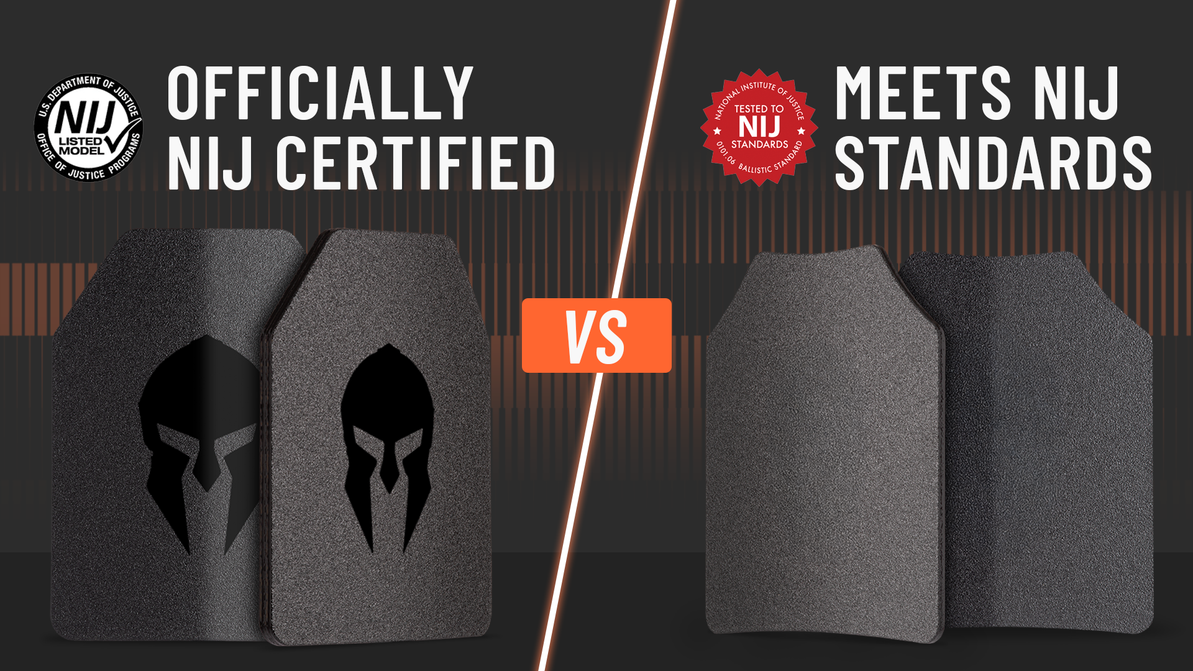NIJ Certification vs "Meets NIJ Standards"
What Does NIJ Certification Really Mean for Body Armor?
At Spartan Armor Systems™, we proudly offer several NIJ-certified body armor products—but what does “NIJ certified” actually mean? More importantly, why should it matter to you as the end user?
In this article, we’ll break down the NIJ certification process, highlight the differences between NIJ certification and “meets NIJ standards” claims, and explain why choosing certified armor provides the highest level of assurance for your personal protection.
Why NIJ Certification Matters
The National Institute of Justice (NIJ) establishes performance standards for ballistic resistance. NIJ certification means that a product has gone through the Compliance Testing Program (CTP)—an intensive, independent evaluation carried out in NIJ-approved laboratories.
Certification is more than just a one-time test. It includes environmental conditioning, ballistic testing, backface deformation measurements, and ongoing follow-up inspections (FIT) to ensure consistent manufacturing quality over time.
Some manufacturers claim their armor “meets NIJ standards” after running in-house or independent lab tests. While these may demonstrate basic performance, they are not equivalent to official NIJ certification. Only NIJ-certified products are listed on the NIJ Compliant Products List (CPL)—the gold standard for agencies and individuals who rely on body armor.
The Difference Between “NIJ Certified” and “Meets NIJ Standards”
- NIJ Certified: Tested through the NIJ Compliance Testing Program, in accredited labs, under controlled conditions. Certified products are listed on NIJ’s official CPL and subject to ongoing inspections.
- Meets NIJ Standards: Indicates the armor was tested to NIJ-like criteria (either in-house or by a third-party lab), but not through the official CTP. Results may vary and are not recognized as certification.
At Spartan Armor Systems™, we take the extra step of testing all our armor—even when not submitted for certification—through independent NIJ-approved labs. This ensures that every piece of armor we produce is backed by real science, not backyard demonstrations.
The NIJ Standard: 0101.06 vs. 0101.07
For many years, NIJ Standard 0101.06 (2008) defined the threat levels most people are familiar with:
- Level IIA: 9mm & .40 S&W handguns
- Level II: 9mm & .357 Magnum handguns
- Level IIIA: .357 SIG & .44 Magnum handguns
- Level III: 7.62x51mm FMJ rifle rounds
- Level IV: .30 caliber armor-piercing rifle rounds
But in late 2023, NIJ released Standard 0101.07 along with NIJ Standard 0123.00, introducing updated testing protocols and a new naming system:
- HG1 / HG2 → handgun threats
- RF1 / RF2 / RF3 → rifle threats (RF3 is the highest, including AP rounds)
We’re currently in a transition period:
- Products certified under 0101.06 remain valid and listed for several years.
- New certifications are now processed under 0101.07/0123.00.
This means you may see both sets of classifications in use until the industry fully transitions.
Inside the Certification Process
NIJ certification is about much more than “shooting a plate.” The process is designed to simulate real-world wear, stress, and ballistic threats:
- Environmental Conditioning
- Hard armor: Exposed to high heat, cold, humidity, drops, and water immersion (for ceramics) before ballistic testing.
- Soft armor: Subjected to tumbling and flexing to replicate years of movement and wear.
- Ballistic Testing
- V0 testing: Armor must stop a specified number of rounds at required velocities with zero penetrations.
- Backface Deformation (BFD): Measured to ensure blunt force trauma stays below safe thresholds (historically ≤ 44mm).
- V50 testing: Determines the velocity at which 50% of rounds penetrate—establishing the armor’s failure threshold.
- Follow-Up Inspections
Even after passing, manufacturers must maintain certification through ongoing audits and random sample testing to confirm production consistency.
Why This Matters for You
Buying armor that is truly NIJ certified gives you confidence that:
- It has been tested in accredited labs, under rigorous conditions.
- Performance claims have been independently verified—not just stated by the manufacturer.
- Ongoing inspections ensure that every batch meets the same standard, not just the test samples.
In contrast, uncertified armor (even if it “meets NIJ standards”) lacks this level of oversight and consistency. While it may perform well in certain tests, there is no guarantee of standardized performance.
The NIJ Mark of Certification
Once ballistic testing is successfully completed, and the NIJ has thoroughly reviewed the armor’s materials, design, and manufacturing configuration, the product may be granted official NIJ Certification. This certification is valid for five years and is the only circumstance under which an armor system is authorized to display the NIJ certification mark on its label.
That small mark carries significant weight—it tells you the armor has met the highest standards of ballistic resistance and quality assurance, giving you confidence in its proven reliability.

Get in Touch:
- Phone: Give us a Call/Text at (520) 396-3335
- Email: info@spartanarmorsystems.com
Recent Posts
-
Understanding Backpack Armor
What Is Backpack Armor? Backpack armor is a discreet armor panel designed to be carried insid …Jan 7th 2026 -
Does Body Armor Expire?
If the milk in your fridge was 2 months overdue, would you still drink it? What if it was chunk …Oct 24th 2025 -
The Advantages of Equipping Trauma Pads
Purpose Spartan Armor Systems® non-ballistic trauma pads are inserts worn behind body armor plates. …Oct 23rd 2025




